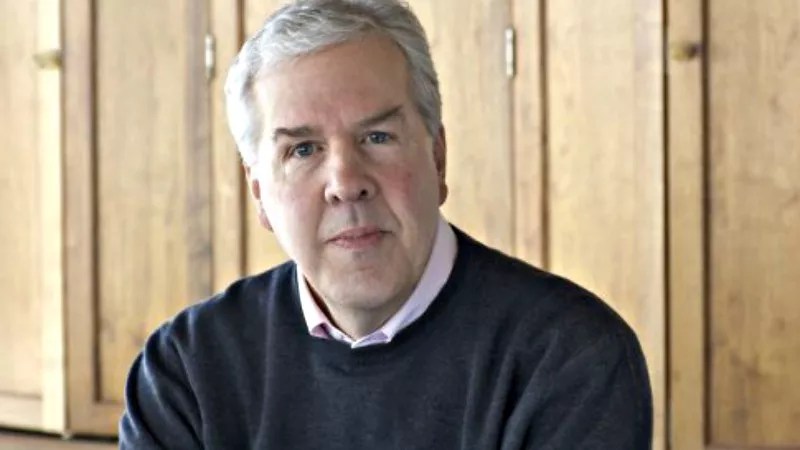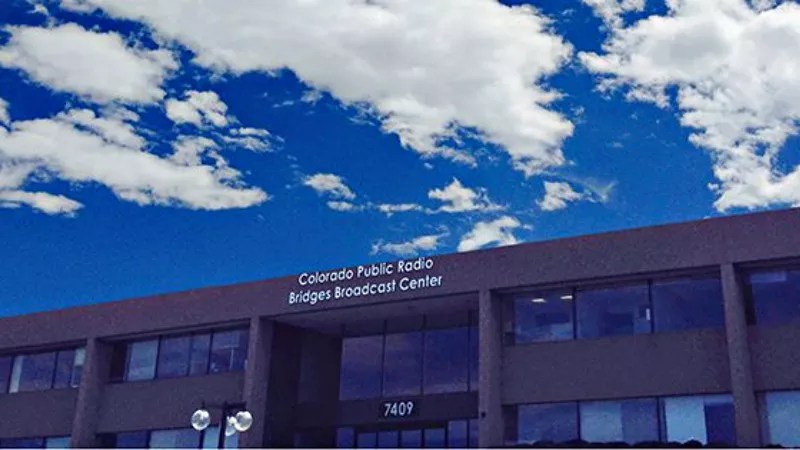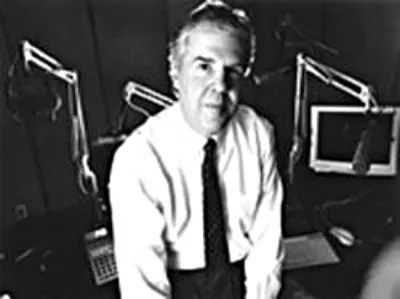

Audio By Carbonatix
After more than forty years with Colorado Public Radio, the majority of it as the organization’s president, Max Wycisk has announced that he’ll step down as CPR’s boss at the end of June 2018. But he stresses that his move shouldn’t be interpreted as a sign of turmoil within the state’s largest and most powerful public-radio network.
“The organization’s very strong,” Wycisk says. “It’s in an excellent position to welcome a new president. There couldn’t be better timing to go about the process of finding my successor.”
Today, Colorado Public Radio has three main pillars: CPR Classical (KVOD at 88.1 FM), CPR News (KCFR at 90.1) and CPR’s OpenAir (KVOQ at 102.3). But once upon a time, the flagship was KCFR – the “CFR” was an acronym for “Colorado Free Radio” – and when it was founded in 1970 as an itsy-bitsy ten-watt outlet, it was a very different creature. “The original KCFR played every genre of music you can imagine,” says Wycisk, who wasn’t yet on staff during this early period. “It was a free-form presentation, where there wasn’t an hour of this and an hour of that. There would be a classical piece followed by a jazz piece followed by a pop piece followed by something else.”
Three years later, as we detailed in our 2002 feature article “Going Public,” the station boosted its power to 30,000 watts, signed on with National Public Radio and tidied up its music format, which began to drift toward classical. Almost immediately, DU attendees rebelled, voting to stop funding KCFR. By 1974, when Wycisk came aboard as a volunteer, the station was making ends meet primarily through donations. This funding shift gave rise to an independence movement that came to fruition in the early ’80s, when Wycisk, who by then had become the station’s manager, helped KCFR cut the umbilical cord connecting it to DU in what he now calls “a friendly separation.”
Still, Wycisk contends, Colorado Public Radio hasn’t entirely abandoned the approach used by KCFR during its freaky youth. “The original philosophy was, ‘Let’s help people learn about their world, learn about what’s going on in science and politics and music.’ The station included all of those things. But what’s happened since is that we’ve simply produced more programming in each of those areas and found better ways of distributing that programming. In the first years, it was broadcast. Now it’s broadcast on the whole variety of digital platforms.”

The House that Max built: Colorado Public Radio’s headquarters in Centennial.
CPR has also spread out across the state in a physical sense. There are currently 34 facilities transmitting the network’s signals, thanks to incursions into plenty of areas in the state that already had homegrown public-radio stations. Hurt feelings resulted in many cases, but Wycisk rejects any characterization of Colorado Public Radio as a bully trying to steal donor bases from tiny competitors.
“I think there’s been a realization over the years that the more public radio, the better, and one station doesn’t take away from another,” he allows. “We’re all supporting the same mission. You can do it in different ways from different locations. So for Colorado Public Radio, focusing on music that matters and in-depth journalism is something we’ll continue to build on. For a number of other public-radio organizations, there are different kinds of focus. But they all ultimately reinforce one another.”
The proliferation of CPR transmitters may be nearing its end. “We’ve had a consistent growth period over many years, but our broadcast infrastructure is pretty much built out,” says Wycisk, who estimates, “We now reach about 90 percent of the population of the state.”
At present, public radio in general – and Colorado Public Radio specifically – seems to be doing a better job of maintaining its audience than many of its for-profit counterparts.
“Years ago, public-radio audiences were pretty small,” Wycisk acknowledges. “Now they’re really quite substantial, and that’s because we’re providing audiences with the information and music they need. And our track record shows that broadcast audiences for public radio have grown at the same time that audiences on digital platforms have grown. So it’s a very different trajectory than what people have thought applies to the commercial radio world.”

Max Wycisk as seen in a Westword file photo.
Photo by Anthony Camera
Colorado Public Radio’s revenue sources are different, too – and they’ve sometimes resulted in controversy. Back in 2013, for instance, CPR received $900,000 from the Bonfils-Stanton Foundation to finance what was described at the time as “an online arts hub intended to serve as a one-stop-shopping place for Colorado cultural info,” besting backers of a rival proposal who’d been making the funding rounds at the same time. But the project was never truly realized. Why not? Wycisk says the gift was meant to be “startup money, and it turned out to not be as large of a grant as we thought. We phased it out, as we planned to, over three years – so now, pretty much everything Colorado Public Radio is doing is supported by listeners and underwriters. There is very little special-project foundation money.”
Not that its coffers are empty. Indeed, CPR is doing so well from on-air fundraising and underwriting that it treats federal money from the Corporation for Public Broadcasting, which conservative lawmakers have dreamed about eliminating for years, as the equivalent of frosting. According to Wycisk, “The figure is actually about 5 percent of Colorado Public Radio’s operating budget – but over the last half-dozen years, we haven’t projected it as part of our budget. So were that money to go away, the organization would not have to make major adjustments. It’s very useful money, but it’s not money one can count on.”
CPR’s financial stability has risen in tandem with its prestiage. Take the recent hiring of Kevin Dale as its news director. A longtime Denver Post editor who played a key role in earning the paper three Pulitzer Prizes, Dale was most recently the executive editor at Cronkite News at Arizona PBS – the sort of gig almost no one leaves unless they’re going out feet first.
For his part, Wycisk is giving up his role at Colorado Public Radio very much on his own terms. He shrugs off talk about legacy – “That’s a very big word,” he says – but expresses pride that “this organization has always looked forward, not backwards, and I don’t think that’s going to change.” As an example, he cites “a fellowship program we’re developing to bring new college graduates into the organization even though they wouldn’t have the qualifications to come in as a staff member all by themselves. It’s a way of building the staffing pipeline of the future.”
Wycisk doesn’t know yet who’ll lead that group. It will be up to the board of directors to choose CPR’s next president, though Wycisk says, “I’ll be involved in that.”
As no one will be surprised to learn.